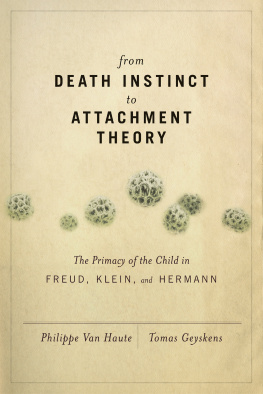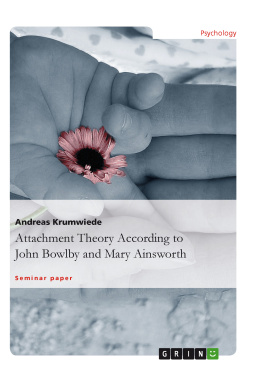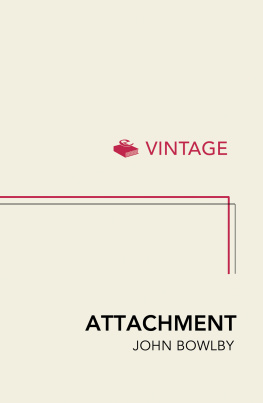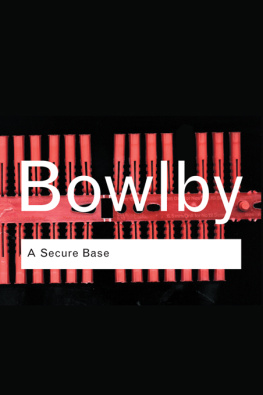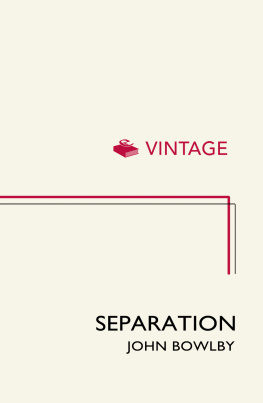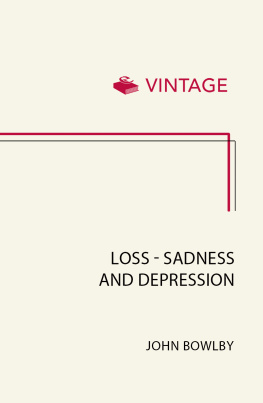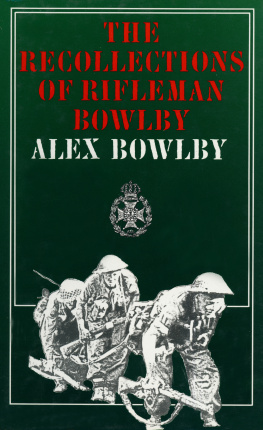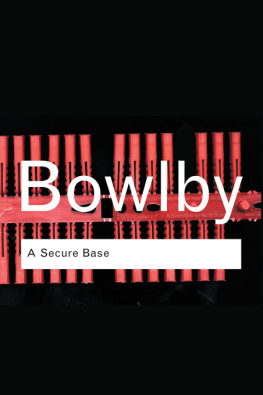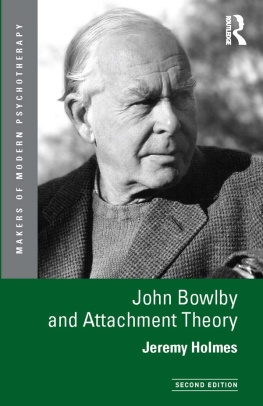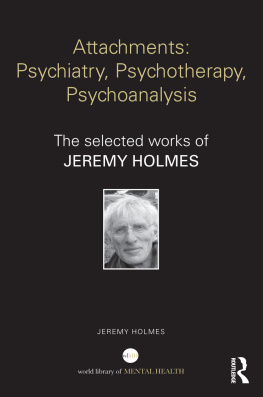Van der Horst Frank C. P. - John Bowlby - From Psychoanalysis to Ethology
Here you can read online Van der Horst Frank C. P. - John Bowlby - From Psychoanalysis to Ethology full text of the book (entire story) in english for free. Download pdf and epub, get meaning, cover and reviews about this ebook. City: Oxford, year: 2011, publisher: Wiley-Blackwell, genre: Politics. Description of the work, (preface) as well as reviews are available. Best literature library LitArk.com created for fans of good reading and offers a wide selection of genres:
Romance novel
Science fiction
Adventure
Detective
Science
History
Home and family
Prose
Art
Politics
Computer
Non-fiction
Religion
Business
Children
Humor
Choose a favorite category and find really read worthwhile books. Enjoy immersion in the world of imagination, feel the emotions of the characters or learn something new for yourself, make an fascinating discovery.

- Book:John Bowlby - From Psychoanalysis to Ethology
- Author:
- Publisher:Wiley-Blackwell
- Genre:
- Year:2011
- City:Oxford
- Rating:4 / 5
- Favourites:Add to favourites
- Your mark:
- 80
- 1
- 2
- 3
- 4
- 5
John Bowlby - From Psychoanalysis to Ethology: summary, description and annotation
We offer to read an annotation, description, summary or preface (depends on what the author of the book "John Bowlby - From Psychoanalysis to Ethology" wrote himself). If you haven't found the necessary information about the book — write in the comments, we will try to find it.
John Bowlby - From Psychoanalysis to Ethology — read online for free the complete book (whole text) full work
Below is the text of the book, divided by pages. System saving the place of the last page read, allows you to conveniently read the book "John Bowlby - From Psychoanalysis to Ethology" online for free, without having to search again every time where you left off. Put a bookmark, and you can go to the page where you finished reading at any time.
Font size:
Interval:
Bookmark:


This edition first published 2011
2011 Frank C. P. van der Horst
Wiley-Blackwell is an imprint of John Wiley & Sons, formed by the merger of Wileys global Scientific, Technical, and Medical business with Blackwell Publishing.
Registered Office
John Wiley & Sons Ltd, The Atrium, Southern Gate, Chichester, West Sussex,
PO19 8SQ, UK
Editorial Offices
The Atrium, Southern Gate, Chichester, West Sussex, PO19 8SQ, UK
9600 Garsington Road, Oxford, OX4 2DQ, UK
350 Main Street, Malden, MA 02148-5020, USA
For details of our global editorial offices, for customer services, and for information about how to apply for permission to reuse the copyright material in this book please see our website at www.wiley.com/wiley-blackwell.
The right of Frank C. P. van der Horst to be identified as the author of this work has been asserted in accordance with the UK Copyright, Designs and Patents Act 1988.
All rights reserved. No part of this publication may be reproduced, stored in a retrieval system, or transmitted, in any form or by any means, electronic, mechanical, photocopying, recording or otherwise, except as permitted by the UK Copyright, Designs and Patents Act 1988, without the prior permission of the publisher.
Wiley also publishes its books in a variety of electronic formats. Some content that appears in print may not be available in electronic books.
Designations used by companies to distinguish their products are often claimed as trademarks. All brand names and product names used in this book are trade names, service marks, trademarks or registered trademarks of their respective owners. The publisher is not associated with any product or vendor mentioned in this book. This publication is designed to provide accurate and authoritative information in regard to the subject matter covered. It is sold on the understanding that the publisher is not engaged in rendering professional services. If professional advice or other expert assistance is required, the services of a competent professional should be sought.
Library of Congress Cataloging-in-Publication Data
Van der Horst, Frank C.P.
John Bowlby : from psychoanalysis to ethology : unravelling the roots of attachment theory / Frank C.P. van der Horst.
p. cm.
Includes bibliographical references and index.
ISBN 978-0-470-68364-4 (cloth)
1. Bowlby, John. 2. Attachment behavior. 3. Attachment behavior in children. 4. Psychoanalysis. 5. Human behavior. I. Title.
BF575.A86V36 2011
155.418dc22
2010046385
A catalogue record for this book is available from the British Library.
This book is published in the following electronic formats: ePDF 9781119993117; Wiley Online Library 9781119993100
To Francisca
About the Author
Frank C.P. van der Horst was born on August 5, 1977 in Delft, the Netherlands. He obtained a Masters in History and one in Education and Child Studies from Leiden University and was offered the chance to do research on a crossroads of both disciplines. Under the supervision of Professors Van der Veer and Van IJzendoorn both notable experts in the field he expanded on the historical and theoretical work at the Centre for Child and Family Studies at Leiden University and focused on the cross-fertilization of ethology and attachment theory, resulting in his Ph.D. thesis John Bowlby and ethology: A study of cross-fertilization. During this project, he discovered many hitherto unknown data in private and public archives and used oral histories to relate the historical development of John Bowlbys ideas.
Currently, Van der Horst works as a psychologist at De Waag Rotterdam, an outpatient clinic for forensic psychiatry, and as a researcher at the Centre for Child and Family Studies, Leiden University. His research aims at describing the history of ideas in the behavioral sciences, such as the ideas and work of John Bowlby, Ren Spitz, William Goldfarb, Jean Piaget, and Harry Harlow. His aim is also to further unravel the roots of attachment theory in, for example, the work of James Robertson and that of developmental psychologist Mary Ainsworth. These studies are necessary to complete our picture of the historical embeddedness of theoretical innovations in developmental psychology.
Foreword
by Professor Jerome Kagan
A question guaranteed to pique the interest of scientists and non-scientists asks, for each phenomenon, to what degree was this event constrained by its past and, therefore, potentially predictable? That is why millions of viewers will watch documentaries describing the origin of our universe or the evolution of life forms. The imprint of the past on the present assumes a special significance when we ask why some adults believe they are less happy than their friends. Economists and political scientists who gather questionnaire evidence from adults in varied societies report that extreme poverty and serious illness are a major cause of unhappiness. Philosophers, on the other hand, argue that a failure to honor ones ethical standards is the enemy of continued serenity or joy. A reasonable proportion of biologists and psychologists share the belief held by Alice James, the younger sister of William and Henry James, that a sanguine or melancholic mood is due, in part, to ones genes.
The strong claim that the experiences of early childhood make a major contribution to adult moods, and by inference quality of adaptation, is relatively recent in the history of ideas. This notion began to gain credence in Europe during the eighteenth century after the size of the middle class had grown and many mothers could stay at home rather than work in the field or at a loom. As a result, society needed to find a critical function for these women and influential commentators nominated a mothers love for her child as the elixir necessary for healthy psychological development. A large proportion of contemporary psychiatrists and psychologists are certain that the quality of the infants emotional relationship with its primary caretaker, preferably the biological mother, affected the probability that the adult will or will not be vulnerable to frequent bouts of anxiety or depression.
John Bowlby tweaked consensual opinion when he replaced the infants need for the sensory pleasures accompanying feeding, which Freud had nominated as formative, with the more psychological need for a feeling of security that a loving mother provides. Bowlbys childhood may have prepared him for this hypothesis. As the fourth child in an upper-middle-class, English family whose care was entrusted to nursemaids who tended the young Bowlby and his siblings in rooms on the top floor of the familys spacious home, Bowlby recalled seeing his mother for about an hour a day and his father once a week. In addition, his favorite nurse left the household when Bowlby was only four years old. Bowlby spent a long, productive career trying to prove that the quality of the interaction between the mother and infant constrained the childs future in a serious way.
Frank van der Horsts beautifully crafted, even-handed history of the 50-year interval between Bowlbys intuition that infants deprived of maternal love were at risk for an unhappy life and Mary Ainsworths 1978 volume, Patterns of Attachment, provides readers with a trail of facts so rich in detail each can decide on the validity of Bowlbys bold idea.
The Bowlby narrative can be divided into four relatively discrete stages. The first centers around Bowlbys brief employment at one of the many progressive schools established in the 1920s as an educational application of Freuds ideas. Most of the children attending this school were emotionally disturbed and some had experienced early separation from parents or obvious neglect. Bowlby regarded these facts as supporting the writings of Ian Suttie, with whom Bowlby was familiar, arguing that a mothers love for the child was as vital for its psychological development as good nutrition was for its physical growth.
Font size:
Interval:
Bookmark:
Similar books «John Bowlby - From Psychoanalysis to Ethology»
Look at similar books to John Bowlby - From Psychoanalysis to Ethology. We have selected literature similar in name and meaning in the hope of providing readers with more options to find new, interesting, not yet read works.
Discussion, reviews of the book John Bowlby - From Psychoanalysis to Ethology and just readers' own opinions. Leave your comments, write what you think about the work, its meaning or the main characters. Specify what exactly you liked and what you didn't like, and why you think so.

